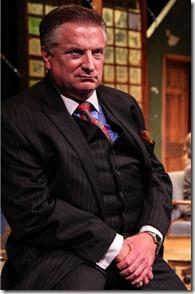
Other People’s Money
Written by Jerry Sterner
Directed by Dennis Zacek
at Theater Wit, 1229 W. Belmont (map)
thru Oct 19 | tickets: $30 | more info
Check for half-price tickets
Read review
Swift-moving and gripping to the bitter greedy end
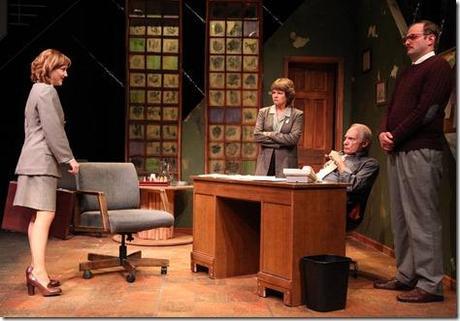
Shattered Globe Theatre presents
Other People’s Money
Review by Lawrence Bommer
It’s disturbing, the characters that audiences today take to heart. When Gordon Gekko, the takeover thug in the anti-Wall Street ”Wall Street,” proclaimed "Greed is good!," crowds cheered. Compared to Oliver Stone’s film and to Caryl Churchill’s anti-entrepreneur ”Serious Money,” Other People’s Money, Jerry Sterner‘s Off-Broadway 1989 hit, now in a revival by Shattered Globe Theatre at Theater Wit, is even-handed and open-minded: This show–which enjoyed a huge run at the Royal George Theatre in the late 80s–reveals, not just both sides of the issue, but the “inside story”– for better or worse, warts and all.
By arguing so well its incompatible cases, Money provokes an audience to choose sides—short-term pragmatism and profits versus long-term investment and jobs. By its end it also stirs us into either imagining a better future–or resigning ourselves to the ubiquitous "what’s in it for me" mentality, warts and all.
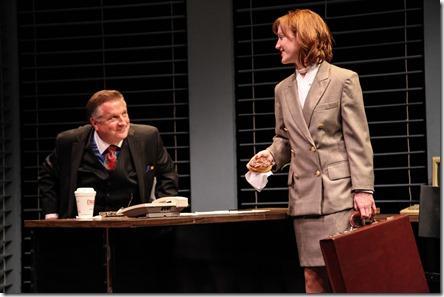
Sterner has the inside dope of a guy who’s been there (he speculated in real-estate and stock before turning to theater). Conveyed from the perspective of multiple narrators, what results is a cunning portrait of Larry "the Liquidator" Garfinkle, a swift shark in the financial waters. This predator wants to "restructure" a small Rhode Island wire and cable company, that is, buy up its undervalued stock, sell off its assets, encumber what’s left with crippling debt and move on to the next predation. (It’s just what Mitt Romney did at Bain Capital.) He’s a mugger with a computer, a user who gobbles down doughnuts and forces up unemployment. Garfinkle is obese, earthy and sexist. He brims over with a life force that’s death to vulnerable businesses ("I don’t need the money, I want the money"). For him the opportunity to enrich greedy "stuckholders" is secondary–there’s a sad soul lurking beneath the bluster; Garfinkle needs money because it offers him "unconditional acceptance." People, he knows, do not.
Opposing this scorched-earth specialist is flinty Andrew Jorgenson, a cheap and stubborn New England CEO who built his firm on old-fashioned principles: he “earned” it by offering a good product that people needed, not just wanted, as well as jobs for loyal workers who in turn sustain their small Rhode Island town. Now he sees Garfinkle "playing God with other people’s money" and creating nothing–but in one day he can destroy the work of lifetimes.
Between them there can be no quarter.
Caught in the clash are Andrew’s assistant Bea, the woman he should have married, and company president William Coles, who fears that, no matter who wins this proxy battle, he loses. Desperate to stop a hostile takeover, Bea persuades her daughter Kate, a high-powered lawyer, to fight Garfinkle. Benefiting from the playwright’s fluid exposition, Kate counsels them in various colorful strategies: "greenmail," "the poison pill," "the white knight," "shark repellent" or, if all else fails, the "golden parachute." To Jorgenson they just translate into "Pay him off or self-destruct." They orchestrate a public relations campaign against Garfinkle (who will, almost incidentally, be throwing 1,200 employees out of work). In a final gripping summation scene the decision is left to the stockholders.
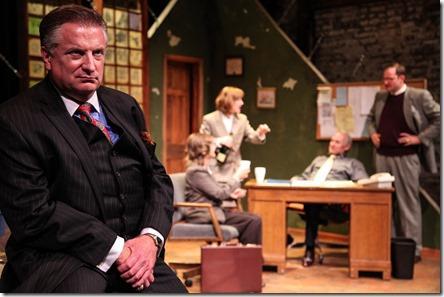
There’s also a sexual subplot as a fascinated Kate and an almost attractively arrogant Garfinkle come to crave each other as legal–and sexual–adversaries. Though repelled by his chauvinist crudeness (and Garfinkle is a major porker), Kate is drawn in by his smooth, power-broker confidence.
Other People’s Money is swift-moving, tightly written and gripping to the bitter end. In this too-close-for-comfort script, the only improbability is the Tracy and Hepburn-like liaison between Kate and Garfinkle. It’s not just unprofessional (considering they’re in litigation), its cuteness blurs bigger issues at stake. But audiences love this kind of sexy byplay.
Directed by Victory Gardens founder Dennis Zacek and opening Shattered Globe Theatre’s 22nd season, this overdue revival (ripe for our “one percent” economic inequality) is indeed an inside job that wisely casts top-notch Chicago actors. Almost too true to the overly ethnic, cut-the-crap role of Garfinkle, Ben Werling (oddly resembling a very mean Rodney Dangerfield) is all oily opportunism and amoral defiance; he may overplay Garfinkle’s bullying, but he doesn’t miss the heavy-hitter’s charm. As his nemesis, Abbey Smith is resilient and attractive but, trying to suggest Kate’s changing feelings about Garfinkle, she blows hot and cold a bit too transparently—just like the script.
Always strong at portraying heartland integrity, Doug McDade‘s Jorgenson and Linda Reiters’ Bea are forthright and down-home decent. Finally, Joe Wiens doesn’t just underline Coles’ ethical dilemma, he universalizes it. We can all join in. Adding much is Andrew Hildner’s bifurcated set, with Larry’s plush marble and cold headquarters office a contrast to Joregenson’s weathered and battered office, with its peeling paint and smudged windows.
For Shattered Globe, Other People’s Money will live up to its name.
Rating: ★★★
Other People’s Money continues through October 19th at Theater Wit, 1229 W. Belmont (map), with performances Thursdays-Saturdays at 8pm, Sundays 3pm. Tickets are $30 (seniors: $25, under 30: $20, students: $12), and are available by phone (773-975-8150) or online through TheaterWit.org (check for half-price tickets at Goldstar.com). More information at ShatteredGlobe.org. (Running time: 2 hours, includes an intermission)
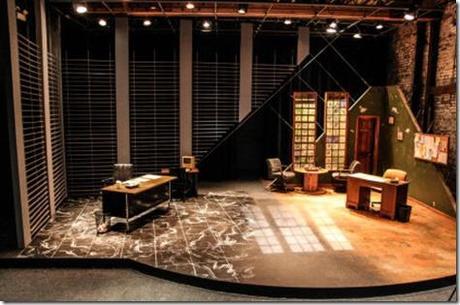
Photos by Emily Schwartz
artists
cast
Doug McDade (Andrew Jorgenson), Linda Reiter (Bea Sullivan), Ben Werling (Lawrence Garfinkle) Joe Wiens (William Coles), Abbey Smith (Kate Sullivan).
behind the scenes
Dennis Zacek (director), Andrew Hildner (scenic design), Sarah Jo White (costume design), Jeton Murtishi (sound design), Mac Vaughey (lighting design), Vivian Knouse (props design), Susan Gosdick (dialect coach), Amanda Rozmiarek (technical director, master carpenter), Jeffrey Clark Stokes (stage manager), Judy Anderson (production manager), Rosie Chevalier (producer), Emily Schwartz (photos)
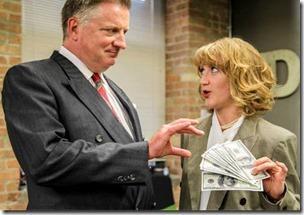
13-0915

